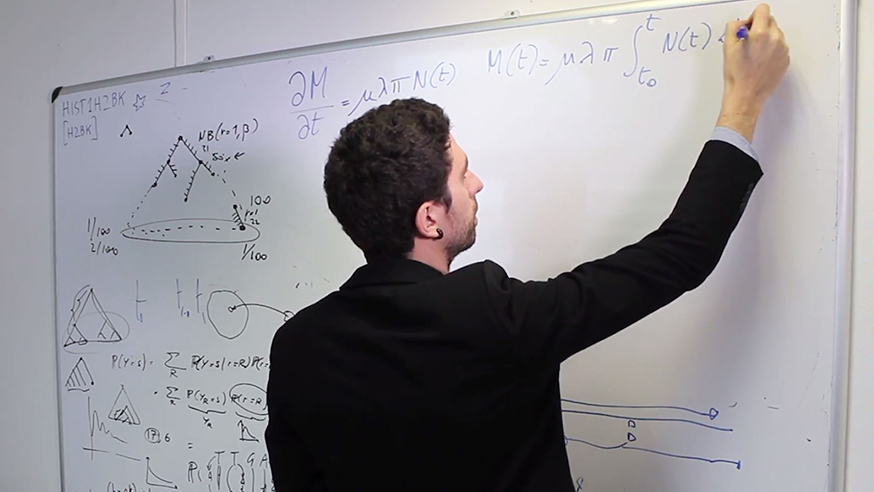
Dr Andrea Sottoriva is using mathematical models to predict cancer's next move.
In gambling they say that the house always wins. Now the mathematical rules that make sure casinos never go bust could help us to predict how cancer will develop, as Dr Andrea Sottoriva discussed in an interview with BBC Radio 4 on Monday 17 October.
Dr Sottoriva leads the Evolutionary Genomics and Modelling Team here at The Institute of Cancer Research, London. Before moving into the field of cancer research, his background was in computer science and particle physics. He used sophisticated models to study neutrinos — elusive high-energy particles produced in space.
This might sound a million miles away from cancer, but mathematical modelling is becoming increasingly important in understanding how cancer works too.
In the past few decades there has been a revolution in biology. Scientists still study cells in petri dishes but increasingly many employ high-powered data analysis technology to spot patterns and make breakthroughs. The massive amount of data produced by technologies like genome sequencing is allowing researchers to analyse cancer in unprecedented detail.
To gain new insights into cancer we need to be able to cut through this complex array of data, and the skills required have more traditionally been the preserve of physics than biology. Researchers need to use the right mathematical tools and sophisticated statistical models to make sense of all this new data about cancer and the ICR is turning to people with backgrounds in physics, maths and computing to help us do it.
A blend of talent
Dr Sottoriva’s lab combines molecular biologists with mathematicians, statisticians and computer scientists to study cancer’s behaviour.
Using mathematical models, it’s possible to take information from chaotic, seemingly incomprehensible systems like cancer, and develop equations that can explain and potentially even predict their behaviour.
Imagine a casino with all sorts of games being played. Despite the random outcome of dice being rolled or cards turned, each game is governed by rules. With only a set number of possibilities at each turn, patterns emerge from the chaos, and the games are carefully controlled to ensure casinos win more times than they lose.
“But if you know the rules you can beat the game,” says Dr Sottoriva.
He explained that cancer growth is governed by the rules of Darwinian evolution. Despite the enormously complex processes occurring in cancer cells, Dr Sottoriva’s team is developing models using evolutionary theory to describe aspects of cancer’s growth and progression.
Watch Dr Sottoriva explain how we can use mathematics to predict cancer's next move in this video produced in July in support of our new Research Strategy.
‘Forecasting’ mutations
These models start from the information we do know about cancer taken, for instance, from tumour samples to predict what might happen next. By studying a snapshot of the mutations present in a cancer at one particular time, it may be possible to forecast the distribution of mutations as a tumour grows, and which ones are likely to be most important for driving the disease. Like models used by weather forecasters to predict if it will rain next week, the forecasts are not perfect, but they’re getting better all the time.
So far Dr Sottoriva’s team has found that genetic mutations in some tumours follow what is known as a power law distribution. This pattern describes how the tumour in an individual patient has grown over time, thus providing the opportunity to make predictions on where cancer may go next in its evolutionary path.
As we begin to understand the rules that govern cancer, we can start to theorise how the disease will respond in particular situations.
And by developing dynamic strategies that change as tumours evolve we can begin to make the rules work in our favour, overcoming the tactics cancer uses to evade current treatments. Like a chess master who looks 10 or 15 moves ahead, we can use the rules cancer follows to outmanoeuvre it.
We’re still some distance away from this goal, but by using mathematics and evolutionary theory to understand the rules, we can beat cancer at its own game.
To listen to Dr Sottoriva's contribution to the BBC Radio 4 programme, visit the BBC Radio 4 website and scroll to 02:49:45 in the programme's recording.
comments powered by